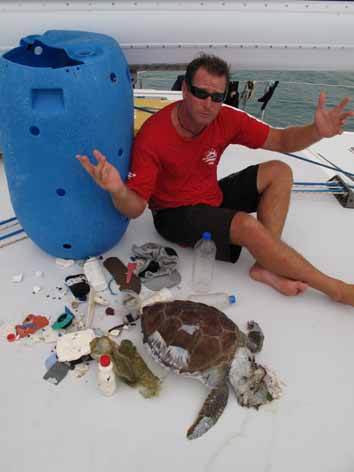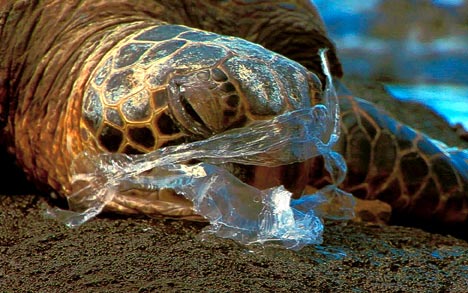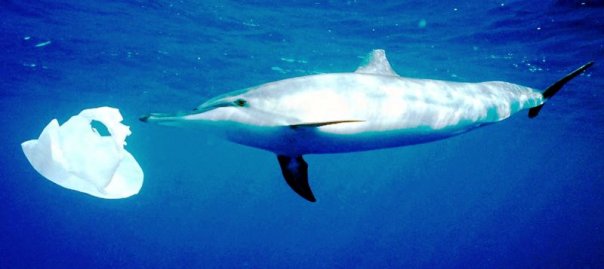The ocean is our playground. We sail on it, we swim in it, we fish from it and without it we don’t have 60-80% of the world’s oxygen……..So why do we abuse it?
The reason we abuse it is because most of us don’t even realise we are. Covering 70% of the planet, our oceans seem to cope with everything we throw at it, right? Well think again.
So let’s go back to the beginning. When we were kids at school we were all taught to clean up all the trash in our playground. So why did we change as we grew older. For many of us, the ocean is our new playground, yet we throw our trash in it all the time, not directly, but we certainly contribute.
Let’s pick two items that are incredibly numerous in our oceans and cause great issues for creatures living in the ocean and the ocean itself, let alone creating health risks to us.
PLASTIC BAGS & PLASITC WATER BOTTLES
What do these items have in common? They have both been created for ‘CONVENIENCE’
PLASTIC BAGS
 This is where it all began for Ocean Crusaders. As a professional skipper in the Whitsundays I began pulling dead sea turtles out of the water so they could be inspected by marine parks. The key moment came when one of the turtles I pulled out was found to have a plastic bag formed perfectly in its stomach. It had died of starvation but not before trying to eat 12 cigarette butts, a plastic water bottle cap and 1/2 a coke can. I set out to educate people of the issue and this is my crusade.
This is where it all began for Ocean Crusaders. As a professional skipper in the Whitsundays I began pulling dead sea turtles out of the water so they could be inspected by marine parks. The key moment came when one of the turtles I pulled out was found to have a plastic bag formed perfectly in its stomach. It had died of starvation but not before trying to eat 12 cigarette butts, a plastic water bottle cap and 1/2 a coke can. I set out to educate people of the issue and this is my crusade.
Our world uses somewhere between 500 billion and 1 trillion plastic bags every single year. They are big numbers but let’s put those numbers into perspective. We see these numbers and we go, O.K that’s big but have you ever tried to count to 1 million, let alone 1 billion or 1 trillion. To count straight through from 1 to 1,000,000 will take you 11 days. Yep, that’s right 11 days. Try 32 years to count to 1 billion. You cannot count to 1 trillion in your lifetime.
Or let’s put it another way, grains of rice. To get 1 million grains of rice you need 25 litres (6.5 gallons) of rice. So multiply that by 1,000 to get 1 billion. So you need 25,000 litres of rice (6,500 gallons).
So let’s look at those numbers again. We use somewhere between 500 billion and 1 trillion plastic bags every year. Based on 500 billion, if we joined them end on end they would circumnavigate the world a whopping 3.1 million times. Imagine laying them out flat, we could wrap our world hundreds of thousands of times.
So now you understand the scale of the issue, let’s go a step further. This is just plastic shopping bags. Add to this figure the plastic used to wrap bread, toilet paper and what about the plastic that pretty much every item in the world is packaged in. It is a massive number that the plastic manufacturers love but our environment hates.
Plastics are like diamonds………they last forever!!!!!
 This is my favourite saying as it is so true. Plastic will never go away. It does not break down, it breaks up…..into millions of smaller pieces that break up further through a process called photo degradation. In samples taken from the North Pacific Garbage Patch 10 years ago it was shown that pieces of plastic the size of plankton were floating around imitating this micro organism. In fact there was a ratio of 6 pieces of plastic to every plankton. Studies last year showed an increase to 45:1 and this is before the garbage from the Japanese Tsunami in March 2011 makes it to this region, believed to be another 1.5 million tonnes of trash floating around the north pacific.
This is my favourite saying as it is so true. Plastic will never go away. It does not break down, it breaks up…..into millions of smaller pieces that break up further through a process called photo degradation. In samples taken from the North Pacific Garbage Patch 10 years ago it was shown that pieces of plastic the size of plankton were floating around imitating this micro organism. In fact there was a ratio of 6 pieces of plastic to every plankton. Studies last year showed an increase to 45:1 and this is before the garbage from the Japanese Tsunami in March 2011 makes it to this region, believed to be another 1.5 million tonnes of trash floating around the north pacific.
The standard single use plastic bag will be around for over 1,000 years before it begins to photo-degrade. So with 500 billion of them added to our world every year, we are creating a problem we cannot clean up. That’s probably why there is enough rubbish in the North Pacific to cover the entire country of Australia 3m (10ft) deep. 50% of plastic bags that make it to the ocean come from landfill so putting them in the bin is not a solution.
 When you add to these statistics the fact that 100,000+ marine creatures and 1 million sea birds die because of plastic suffocation or entanglement every year, it is time for all of us to change our habits and as ocean users, we should be leading the way.
When you add to these statistics the fact that 100,000+ marine creatures and 1 million sea birds die because of plastic suffocation or entanglement every year, it is time for all of us to change our habits and as ocean users, we should be leading the way.
You all know the alternatives for shopping bags. It’s only because we are lazy that we don’t use them as often as we should. Just remember to put them back in your car when you’ve unpacked the shopping so they are there when you want them next. If you do need to use plastic bags for rubbish bins etc. use compostable bags that by law have to decompose within a short period of time, usually 6 months maximum pending your country.
By Ian Thomson
Part 2 in the series will focus on Plastic Water Bottles.


Pingback: Ecohandy reusable shopping bags » Ocean Crusaders
Comments are closed.